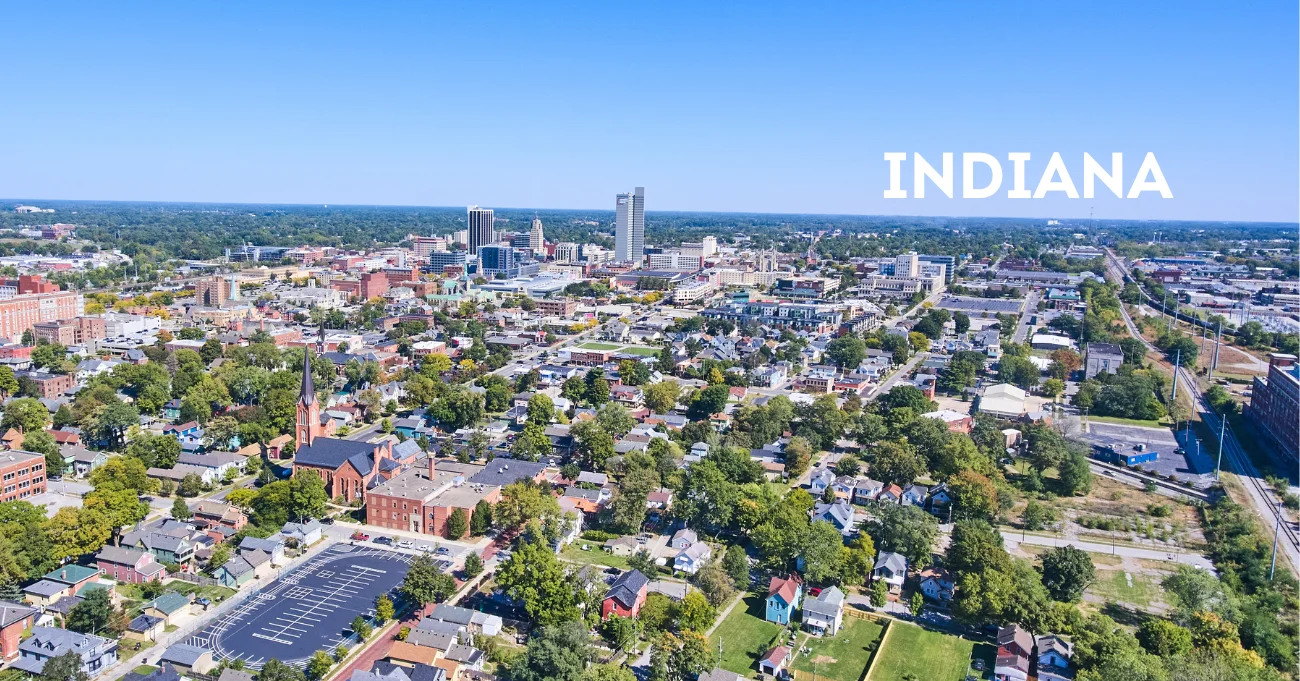Securing the right financing is crucial for successful real estate investment, especially in Indiana’s relatively stable market. DSCR loan Indiana is becoming increasingly popular due to the state’s favorable market conditions, offering investors flexibility not found with other types of investment property loans. Leveraging such market stability, investors can now acquire additional properties with greater ease, expanding their portfolios more efficiently.
At Defy Mortgage, we streamline the mortgage process for our 75+ non-traditional lending solutions designed for entrepreneurs, self-employed individuals, and real estate investors in a variety of different states. Whether you’re looking for DSCR loans, foreign national loans, or other non-QM loans available at Defy, we provide fast pre-approvals, transparent communication, and dedicated support to ensure clients feel supported and informed every step of the way.
Coming from our extensive experience in providing diverse investment opportunities in states like Georgia, Tennesse and more, we’ve outlined this guide to securing DSCR loans in Indiana. We’ll provide detailed information about how DSCR loans work in Indiana and the eligibility criteria to qualify for this loan.
From exploring the minimum DSCR to uncovering the eligible property types, we’ll swivel through the pros and cons of this loan option to make the most of your investment strategy in Indiana.
Let’s dive in!
How Does DSCR Work for Indiana Properties?
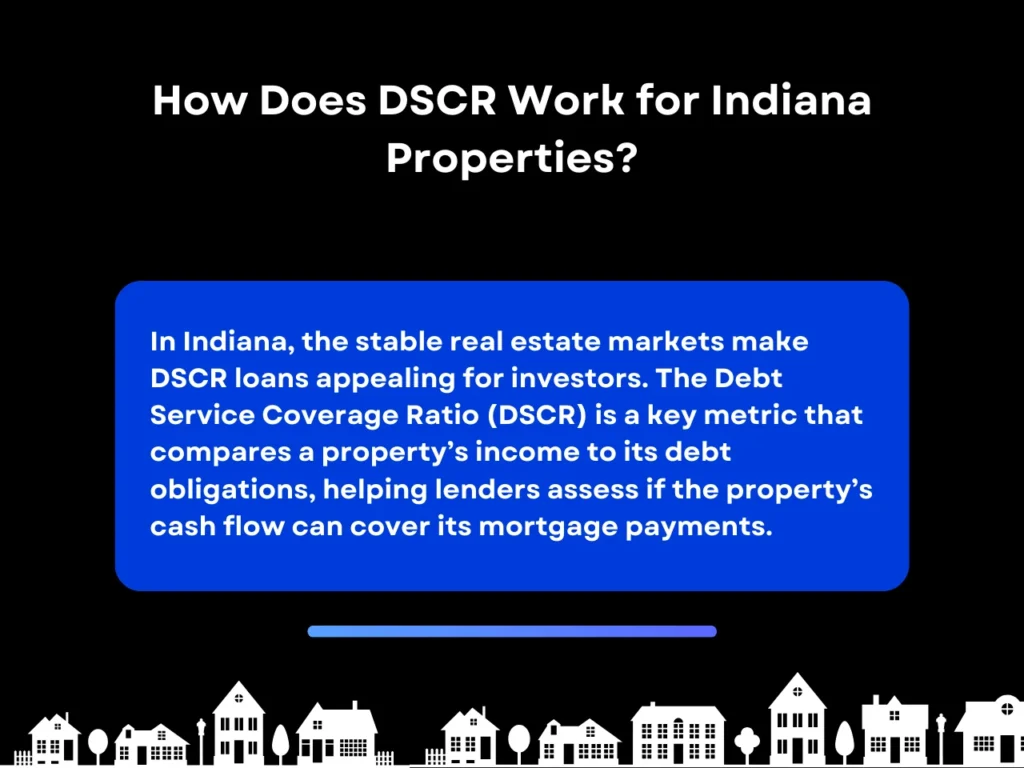
In Indiana, real estate markets are renowned for their stability, making it an attractive option for investors looking to enhance their returns. With the thriving properties in highly urbanized areas, including Indianapolis, Bloomington – where Indiana University is, and Fort Wayne, obtaining a DSCR loan Indiana offers strong potential for positive cash flow.
The Debt Service Coverage Ratio (DSCR) is a key metric in securing better financing for Indiana investment properties. It compares the income generated by a property relative to its debt obligations. Lenders use this ratio to assess whether the property’s cash flow is sufficient to cover its mortgage payments.
DSCR is calculated by dividing the property’s Net Operating Income (NOI) by its total debt service (i.e., the mortgage payments). For instance, if an Indiana rental property generates $100,000 annually and the annual mortgage payment amount is $80,000, the DSCR would be 1.25.
A ratio of 1.0 or higher indicates that the property can cover its debts, which is why lenders favor higher DSCR values. The stability and high-income potential of the Indiana market make it more likely for borrowers to get approved for a DSCR mortgage loan with competitive or better interest rates.
Eligibility Criteria for DSCR Loans in Indiana
Securing DSCR loans in Indiana requires meeting certain eligibility criteria. Before starting the application process, make sure to evaluate the property’s income potential and meet the lender’s specific credit requirements.
Prepare these necessary details to ensure a smooth application process:
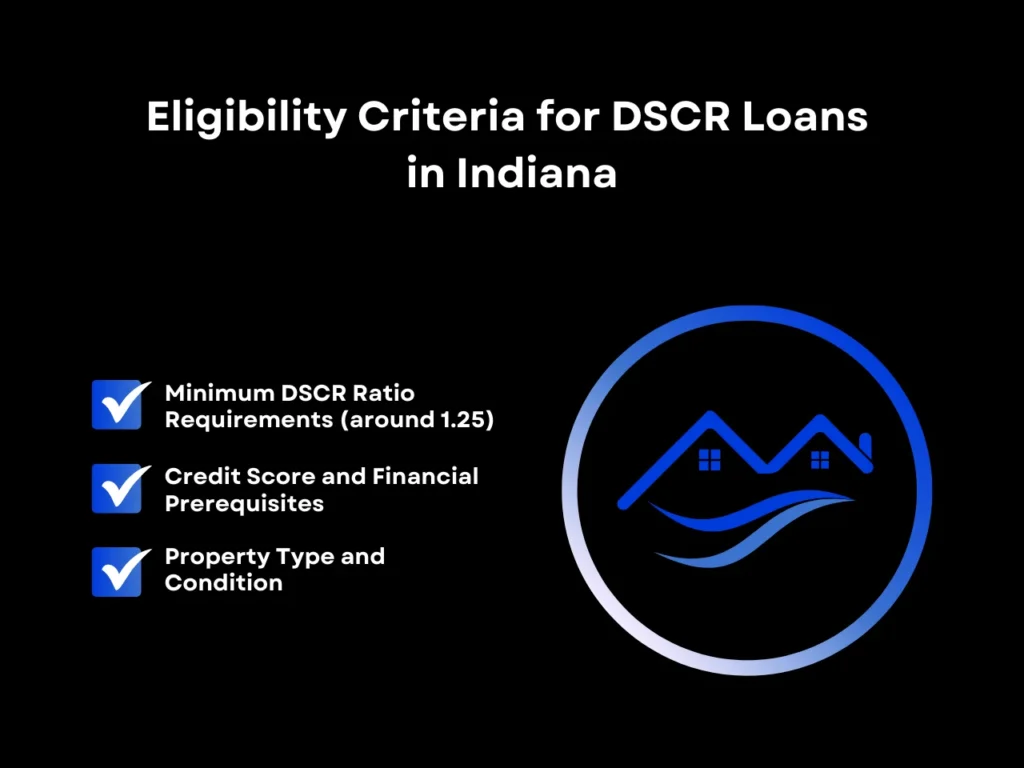
Minimum Debt Service Coverage Ratio (DSCR) Requirements
Most lenders require a minimum DSCR of around 1.25, though some may offer more flexibility depending on the property’s income potential. This ratio signifies that the property generates sufficient income to cover the investment property mortgage rate and loan payments. Lenders prefer properties with higher DSCRs as they are seen as less risky, often leading to better rates for investment property mortgage loans.
In densely populated regions of Indiana, such as Indianapolis and Fort Wayne, competition for rental properties is high, so DSCR lenders may look for DSCRs of at least 1.5, depending on factors such as property type, local market conditions, and the borrower’s financial history. Defy, however, offers DSCR loans for investment properties with DSCRs as low as 0.75.
Credit Score and Financial Prerequisites
While DSCR loans offer more flexibility than traditional mortgages, most lenders still require a minimum credit score, typically ranging from 620 to 680, depending on perceived risks. At Defy Mortgage, we only require borrowers to have a FICO score of at least 620 for DSCR loans.
Additionally, although personal income is not the primary focus, some private lenders may still request documentation, such as bank statements or business records, to verify your experience in managing an investment property successfully.
Here at Defy, we don’t require tax returns for our DSCR loan options. We are committed to making your mortgage experience as convenient as possible, and hence, we even provide foreign national loans even if you don’t have a U.S. credit score or social security number.
Property Type and Condition
Residential units (such as single-family homes, duplexes, or multi-family units) and commercial properties are generally eligible for DSCR loan Indiana, as long as they’re investment properties that generate rental income. However, lenders usually impose strict requirements on the property’s condition. Properties with a proven track record of generating enough or lucrative rental income have the best chance of approval.
Here’s a breakdown of certain property types eligible for DSCR loans:
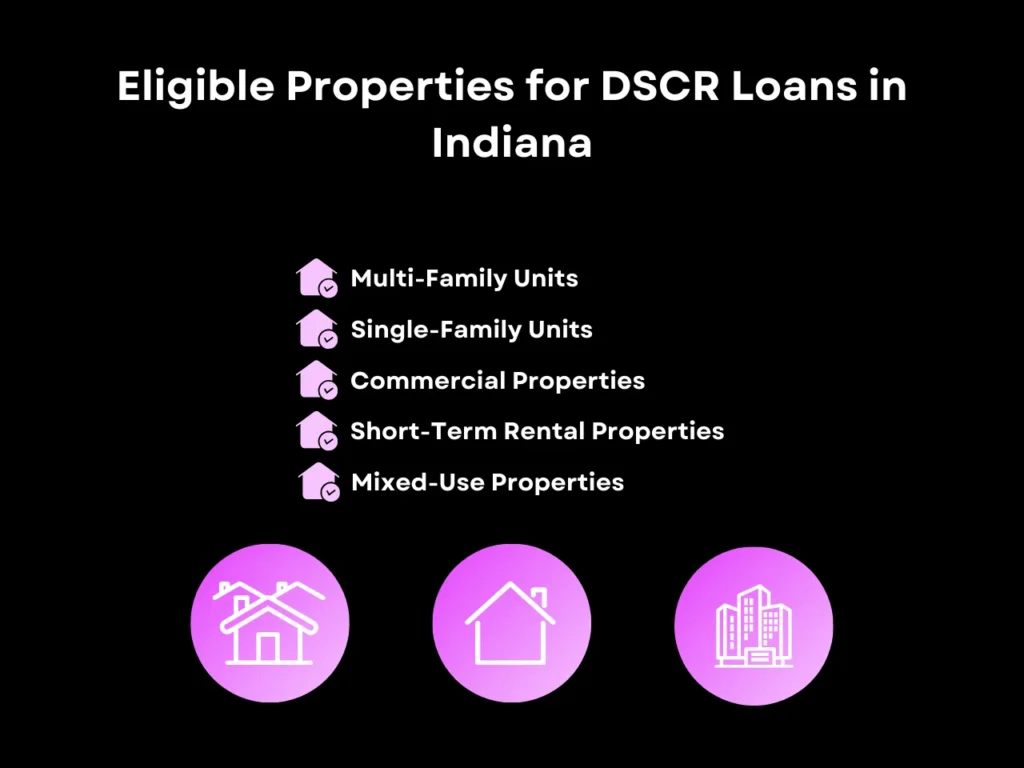
1. Multi-Family Units (1+ units)
Multi-family units are top-tier choices for DSCR loan investment in Indiana. With the potential to generate income from multiple tenants, these properties offer increased stability and a higher chance of getting a favorable DSCR loan. Smaller cities, like Evansville, can also have a high demand for affordable rental housing, which essentially guarantees a positive cash flow.
More than that, Indiana’s landlord-friendly laws provide legal advantages to owners, such as fewer restrictions and streamlined property management processes. These favorable conditions help reduce lender risk and enhance your eligibility for a DSCR loan.
2. Single-Family Units
Single-family units tend to have less income potential than multi-family units, but they’re still a solid and versatile choice for investors seeking DSCR loans in Indiana. These properties are easier and more cost-effective to manage and often attract more long-term tenants, resulting in a steady income stream.
Take note that some markets like Fishers, Carmel, and Greenwood have a high demand for single-family rentals. This means that you’ll most likely get approved for a DSCR loan if you intend to buy in these areas. Single-family units in good condition usually appreciate faster than other property types, making them great for a more secure long-term investment.
3. Commercial Properties
Indiana’s major business hubs, such as Indianapolis, Fort Wayne, and South Bend, have high demand for office buildings, warehouses, and retail locations. Since commerce is steady in these areas, investors can enjoy and benefit from long-term lease agreements with stable tenants.
However, it’s important to act quickly as availability may be limited. If you find an opportunity to buy a property with high income potential, you’re likely to get approved for a DSCR loan to snatch it up quickly. Indiana’s relatively low commercial property taxes further add to its appeal, allowing for greater profit margins.
4. Short-Term Rental Properties
The short-term rental market has recently surged in Indiana, particularly in cities with significant tourism or event traffic, including Indianapolis, Bloomington, and Fort Wayne. Properties listed on platforms like Airbnb can potentially generate higher rental income compared to traditional long-term leases, making it an appealing option for securing DSCR loans for short-term rentals.
Moreover, Indiana’s regulations for short-term rentals like Airbnb and vacation homes are relatively lenient compared to other states, allowing investors to capitalize on this high-income potential. Lenders can then assess the strong rental income these properties generate, helping investors overcome the challenges of stringent traditional income verification requirements.
5. Mixed-Use Properties
Mixed-use properties, which combine both residential and commercial elements, present an attractive investment option for a DSCR loan Indiana. These properties are often located in rapidly developing urban centers and suburban areas.
As a rule of thumb, look for a mixed-use property that has guaranteed occupancy for both commercial and residential tenants, as lenders will see that as inherently less risky. This leads to dual income sources that can enhance the property’s DSCR, making it a more favorable investment.
Pros and Cons of Opting for a DSCR Loan
Taking out an Indiana DSCR loan can be instrumental to successful real estate investing in the state. However, like all loan options (and all things in life) there are a few disadvantages to keep in mind with this loan type. Below, we’ll provide a rundown of its pros and cons to help you make an informed decision.
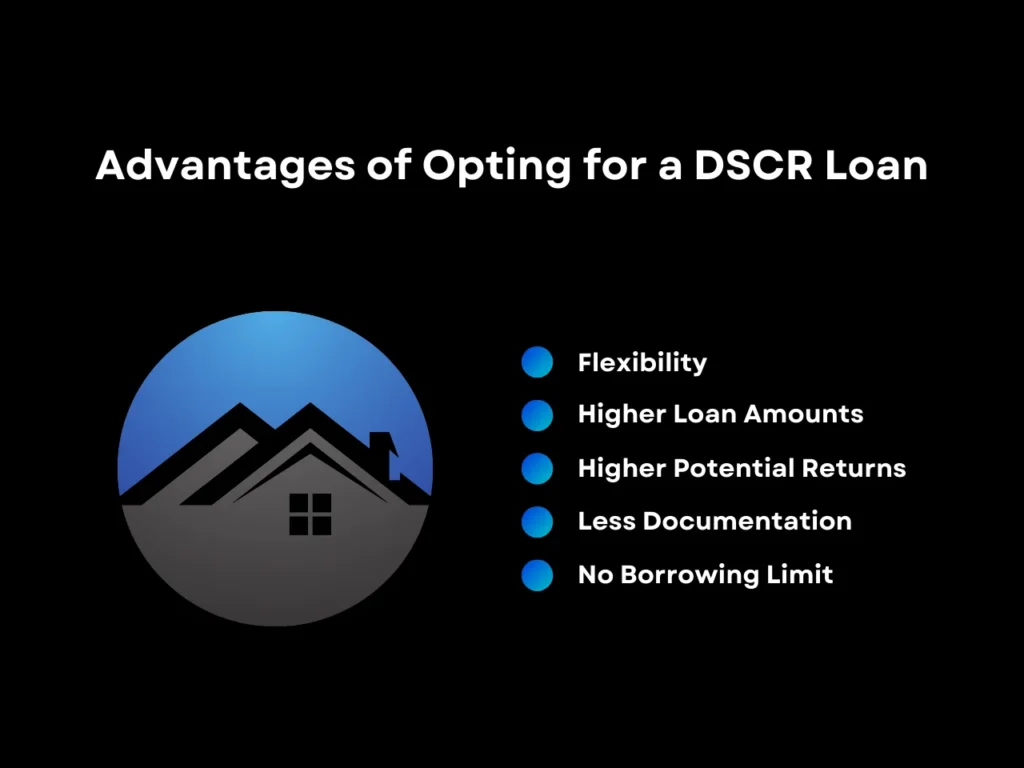
Pros
- Flexibility: DSCR loans focus on the property’s income-generating potential rather than the borrower’s personal finances. This proves beneficial for securing a better financing option as long as you choose a well-performing property, regardless of your financial situation.
- Higher Loan Amounts: By focusing on property performance, DSCR loans can allow for larger loan amounts than traditional loans. Investors looking to scale their portfolios with multiple properties or those who want extra capital to reinvest into the property can benefit from this loan option to increase their rental income.
- Higher Potential Returns: With the ability to obtain larger loan amounts to acquire more properties or reinvest in existing ones, you can achieve higher returns on your investments.
- Less Documentation: Unlike traditional loans that often require extensive documentation and verification, such as your DTI ratio and cash reserves, DSCR loans streamline the approval process, focusing primarily on the property’s cash flow.
- No Borrowing Limit: As long as you find properties that have high income potential, there’s no strict limit on how many properties you can purchase with a DSCR loan, contrary to traditional home mortgages.
Possible Cons
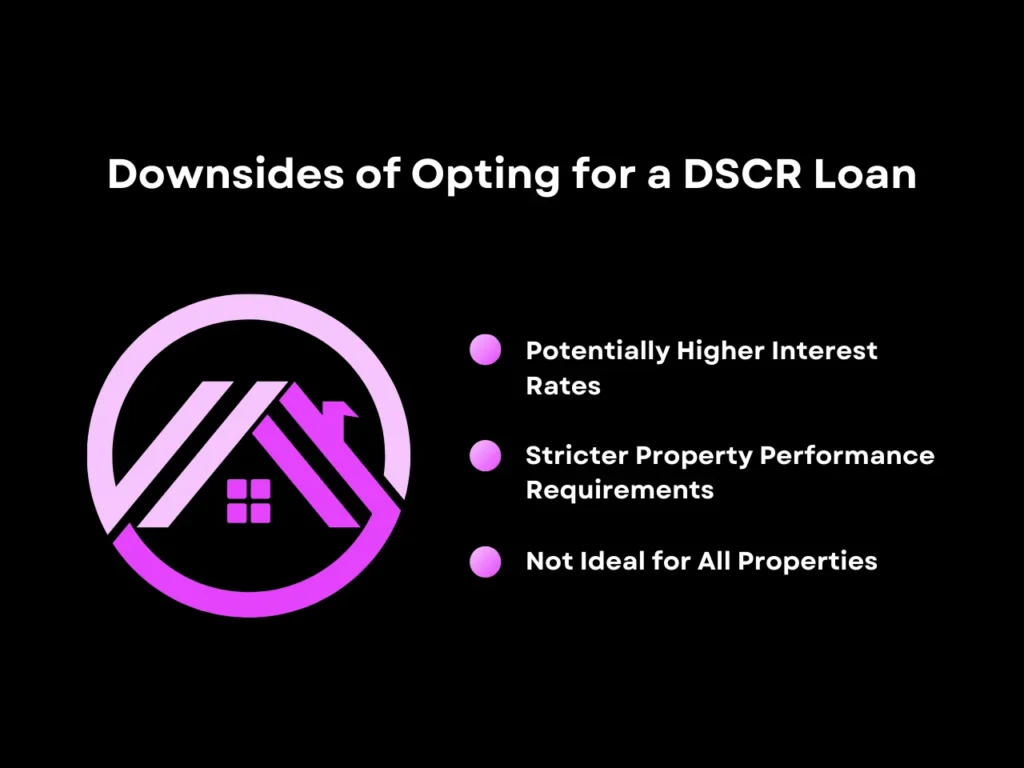
- Potentially Higher Interest Rates: Compared to conventional mortgages, borrowers can expect a higher DSCR loan interest rate, typically around 7.20%, if their DSCR is low. At Defy, however, allow ratios as low as 0.75, while keeping our loan rates competitive even for underperforming properties.
- Stricter Property Performance Requirements: Lenders often expect a stable and strong DSCR from the property. If the rental income decreases significantly, it could hinder your ability to maintain loan payments or secure future financing. To qualify, it’s essential to build a strong credit profile or make higher down payments.
- Not Ideal for All Properties: Properties that are underperforming or in poor condition might face more challenges qualifying for a DSCR loan, as lenders place high importance on their cash flow potential. Borrowers can still get approved, but it may come with higher interest and lower loan amounts.
Note that all of the above downsides are easily minimized if you choose properties that are guaranteed to have a high positive cash flow. Focusing on high-demand areas and maintaining the property well will increase your chances of maximizing the benefits of a DSCR loan.
DSCR Loan Indiana FAQs
What is the minimum DSCR acceptable in Indiana?
Lenders in Indiana typically require a minimum DSCR of 1.25, though some may look for lower ratios depending on the property’s potential, market conditions, and sometimes the borrower’s personal financial profile. At Defy, we offer DSCR loan programs for investment properties with DSCRs as low as 0.75.
Can I qualify for a DSCR loan with a low credit score?
While DSCR loans offer flexibility, most lenders still require a minimum credit score of around 620 to 680 to qualify for a DSCR loan Indiana. A higher credit score can lead to lower mortgage interest rates and other favorable loan terms. Defy only requires borrowers to have a FICO score of 620 for DSCR loans.
Are there property types that are not eligible for DSCR loans?
Most residential and commercial properties that generate sufficient income qualify for DSCR loans, but properties in poor condition may struggle to meet lender requirements. Note that DSCR loans cannot be used to buy a primary residence, but they can be used for second homes intended for rental.
How does the DSCR loan process differ from traditional mortgage applications?
Unlike conventional loans, DSCR loans focus on the property’s income rather than the borrower’s personal income, simplifying the application process for investors with non-traditional earnings.
What strategies can improve my DSCR loan application?
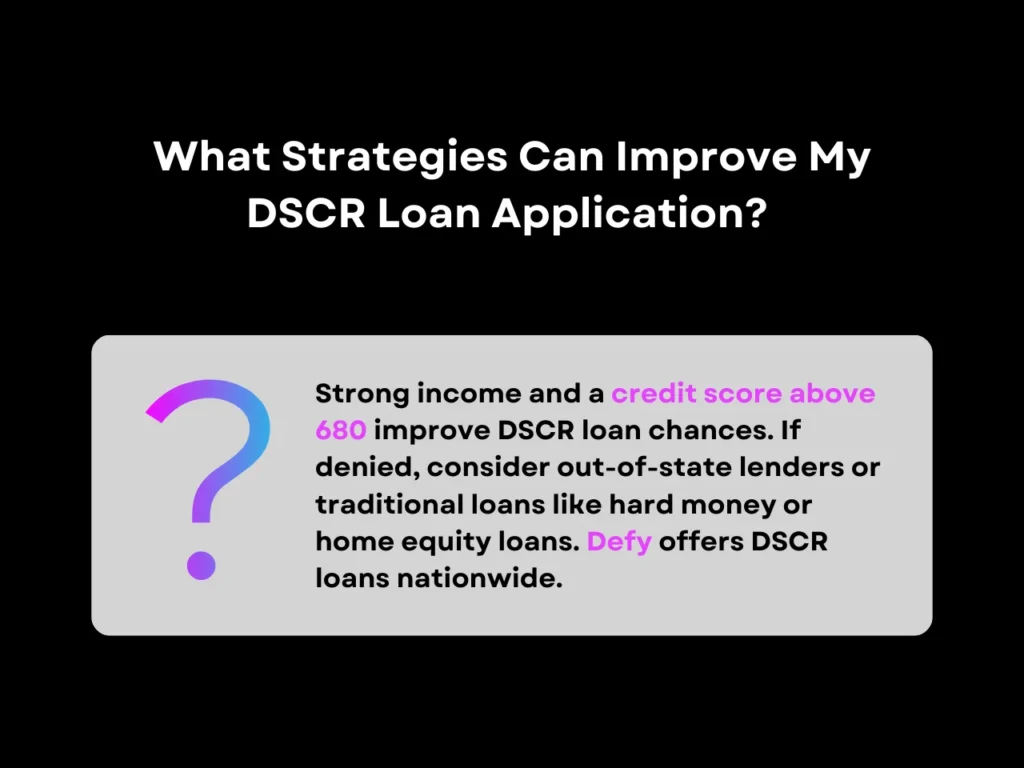
Ensuring that your property generates strong, stable income and keeping your credit score above 680 can improve your chances of approval and better loan terms. But if you can’t get approved for a DSCR loan in Indiana, consider looking for out-of-state mortgage lenders, other states or other types of loans like hard money loans or home equity loans. Another tip: Private mortgage lenders often offer more flexible terms, while non-QM loans can also be viable for those with unique income sources or credit challenges.
Key Takeaway
Securing a DSCR loan Indiana offers a promising opportunity for investors. The state’s growing rental demand and stable market make it an attractive option to maximize their investment returns. The flexibility of this loan program extends beyond growing their portfolio to scale their investments better without the constraints of conventional mortgage requirements.
Armed with actionable insights, you can maximize your chances in getting better rates and higher loan amounts for DSCR loan Indiana. Start by maintaining a good DSCR and selecting properties with strong cash flow potential, may it be multi-family units, single-family homes, and short-term rentals. If you’re less experienced in property management, focus on multi-family and single-family properties to ensure a consistent rental income stream.
Ready to get started with your DSCR loan application? Let’s connect. Hop on a call with Defy Mortgage today to discuss the best mortgage solutions tailored to your goals, or fill out a quick form here. We offer DSCR loans in a variety of states including Alambama, Florida, Colorado, Ohio, and more.
Whether you need DSCR loans, VA loans, HELOCs, Bank Statement loans, or others, our streamlined approach to processing applications will give you quick and easy access to the financing you need.

